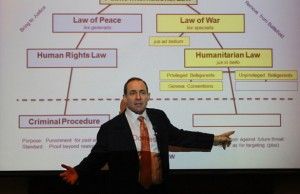Guantanamo Bay’s events to affect U.S. history

February 24, 2013
Global experts brought the university their views on one of the world’s most notorious prisons during a SIU Law School event Friday.
The university’s law school hosted “Guantanamo Bay: What Next?,” a symposium that targeted the U.S.-owned Cuban detention center — established in 2002 to hold detainees the U.S. determined to be connected with enemies in Afghanistan and Iraq — and its relation to international law and the Constitution. Questionable conditions and interrogation practices keep Guantanamo Bay in the news, and the symposium’s participants gave their opinions of the past, present and future of the prison.
Keynote speaker William Lietzau, deputy assistant secretary of rule of law and detainee policy for the U.S. Department of Defense, said Guantanamo Bay’s creation was an attempt to deal with terrorism such as the 9/11 attacks without passing laws to solve the problem.
Advertisement
“Moving detainees to Guantanamo was a practical solution that, to the people who made that decision at the time, seemed like the best answer for some practical problems they were dealing with,” he said.
Though an official date has not been given for Guantanamo Bay’s closure, Lietzau said the prison will affect U.S. history and laws.
“I don’t think there is any question that, for any number of reasons, Guantanamo Bay, that term will have a negative impact on many people as they reflect on the United States conduct in this war,” he said.
However, Lietzau said he is proud of the country’s leadership in determining the best practices to hold detainees, he said.
While Guantanamo Bay might have a rough history, Lietzau said he thinks the prison will result in national and international law changes to determine how to deal with holding terrorists.
“I think that international law will develop the same way it has throughout history, and it’s often in the aftermath of conflict that we find that development,” he said.
Other speakers discussed how the prison’s legalities worked as well as the complexity of the issue of what is legal at the facility.
Advertisement*
Michael J. Strauss, a U.S. journalist who was stationed at the Center for Diplomatic and Strategic Studies in Paris, said Guantanamo Bay’s problem is the way the country attained it. Cuba’s prison leasing allowed indefinite use of the facility, he said.
Strauss said other minor wordings and executive agreement technicalities between the countries made in the 1903 Cuban-American Treaty — which gave the U.S. control over the Guantanamo Bay area in exchange for the Republic of Cuba’s ultimate sovereignty over the area — allowed the U.S. to do whatever it wished with the land.
“The U.S. was the only one of the two parties that could exercise jurisdiction and control, and because the definition of a naval station is so fluid, that jurisdiction and control can extend to anything the U.S. does there,” he said.
Strauss said other lease technicalities allowed the U.S. to remain in the area after the Cuban Revolution. He said only some U.S. authority and legal action applies there because it is a leased territory, and the U.S. jurisdiction remains unclear. It is also unclear if Cuba is responsible for Guantanamo Bay human rights because of these legalities, he said.
One expert addressed how the detainees’ future is uncertain even after the end of conflicts in Iraq and Afghanistan.
Eric Jensen, associate professor of law at Brigham Young University and former U.S. Army Cavalry officer and judge advocate, said there are issues that deal with how to release detainees, especially since President Barack Obama announced in his State of the Union address that the U.S. will leave Afghanistan by the end of 2014.
Jensen said prisoners of war are required by law to be released after the war has ended. However, he said the U.S. leaving Afghanistan does not mean detainees are no longer a threat because al-Qaeda occupies many nations.
While the discussion may not end the Guantanamo Bay debate, one administrator said she felt the event was beneficial.
Alicia Ruiz, director of communications and outreach at the university’s law school, said the law school has hosted symposiums for several years. Ruiz said some SIU professors were invited to visit Guantanamo Bay and was interested in holding the symposium.
“Everything I’ve heard has been very positive so far,” she said. “We don’t have … a lot of people in this geographic area that would ever represent a detainee or be directly involved, but I still think it’s very helpful for them to understand those issues and the larger policy issues involved in all of the discussions.”
Advertisement








